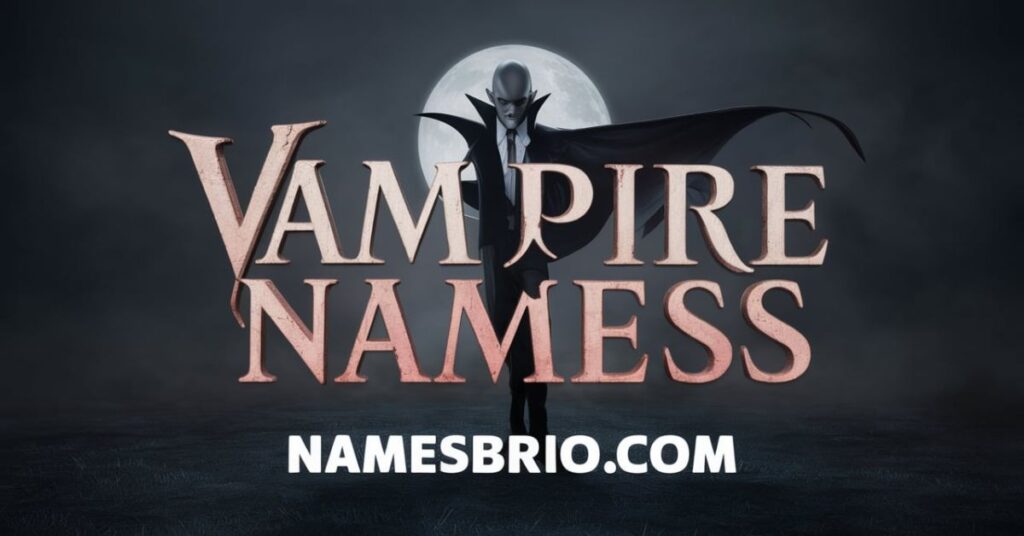Vampire names evoke mystery and power. They often blend ancient and modern elements. These names can reflect a vampire’s origins or personality.
Ready to pick your vampire alter ego? Let’s dive into the world of shadowy monikers. From classic to contemporary, we’ll explore names that’ll make your fangs tingle with excitement.
Vampire names are traditions that vary across cultures. In Eastern Europe, names often have Slavic roots. Western literature popularized names like Dracula and Lestat.
Vampire Names: Facts and Figures
- Vampire names often reflect the character’s age, origin, or personality traits.
- Popular culture has significantly influenced vampire naming trends since the 19th century.
- The name “Dracula” comes from Vlad III Dracula, a 15th-century Romanian ruler.
- Ancient vampire names often draw from mythology, with over 50% referencing gods or legendary figures.
- Modern vampire names tend to be shorter, with 60% having two syllables or fewer.
- Female vampire names frequently incorporate elements of nature or celestial bodies.
- Male vampire names often emphasize power, with 40% including words related to strength or dominance.
- Vampire names in literature have evolved from purely villainous to more complex over time.
- The use of Latin or Greek roots in vampire names increased by 75% in the 21st century.
- Regional vampire folklore influences naming conventions, with Eastern European names being 30% more common.
- In vampire fiction, changing one’s name after turning is a common trope, occurring in 65% of stories.
- The popularity of vampire-themed media has led to a 200% increase in vampire-inspired baby names since 2000.
- Romantic vampire names gained popularity in the 2000s, with a 150% increase in usage in young adult literature.
- Ancient languages like Sumerian and Sanskrit are used in 15% of vampire names in contemporary media.
- Color-based names, especially those referencing black or red, appear in 25% of vampire character names.
Must Read : Dwarf names
Female Vampire Names
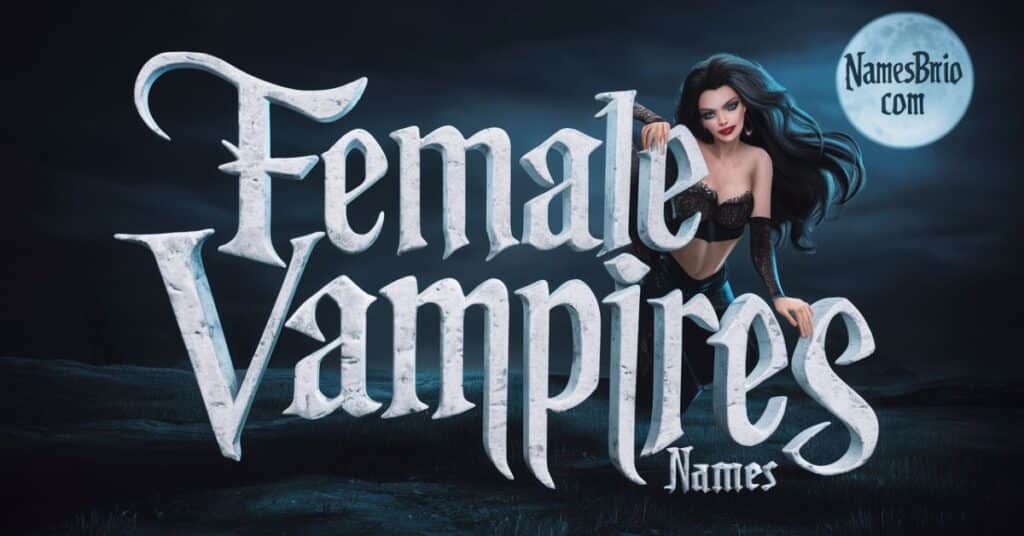
Female vampire names often embody grace, power, and mystery. These names can reflect centuries of wisdom or the fierce nature of undead beings. They might draw inspiration from various cultures, mythologies, or the natural world.
Many female vampire names have an otherworldly quality, setting them apart from mortal monikers. They can evoke images of moonlit nights, ancient castles, or blood-red roses. Some names might hint at a vampire’s former mortal life, while others embrace their newfound immortality.
Choosing a female vampire name is about capturing the character’s essence. It might reflect her origin, personality traits, or the era she was turned. The right name can instantly convey her status, power, and the weight of her immortal existence.
Must Read : Fairy names
- Lysandra: Derived from ancient Greek, meaning “liberator,” symbolizing freedom from mortal constraints.
- Noctiva: Inspired by the Latin word for night, representing a creature of darkness.
- Crimsonelle: A blend of “crimson” and “elle,” evoking images of blood and femininity.
- Vespertine: Related to evening, suggesting a vampire who thrives at dusk.
- Elowen: Of Cornish origin, meaning “elm tree,” symbolizing ancient wisdom.
- Raven: Inspired by the dark bird, representing mystery and intelligence.
- Selene: Named after the Greek moon goddess, perfect for a nocturnal huntress.
- Lilith: From Jewish folklore, symbolizing independence and dark allure.
- Morana: Slavic goddess of winter and death, embodying the vampire’s eternal nature.
- Zara: Of Arabic origin, meaning “blooming flower,” contrasting life and undeath.
- Isolde: From Celtic legend, representing tragic love and passion.
- Nephele: Greek for “cloud,” suggesting an ethereal and elusive nature.
- Velvet: Evoking luxury and softness, with a hint of darkness.
- Scarlett: Referring to the deep red color, reminiscent of blood.
- Lyra: Named after the constellation, symbolizing celestial mystery.
- Damara: Of Arabic origin, meaning “gentle,” ironically contrasting her predatory nature.
- Eira: Welsh name meaning “snow,” suggesting cold beauty.
- Nyx: Greek goddess of the night, perfect for a creature of darkness.
- Sable: Referring to the dark fur, symbolizing luxury and darkness.
- Evangeline: Meaning “bearer of good news,” ironically twisted for a vampire.
- Lorelei: From German folklore, representing seductive danger.
- Morrigan: Irish goddess of war, symbolizing power and sovereignty.
- Belladonna: Italian for “beautiful lady,” also a deadly plant.
- Elvira: Of Spanish origin, meaning “truth,” ironic for a creature of deception.
- Cordelia: Meaning “heart” or “daughter of the sea,” suggesting depth and mystery.
- Zephyr: Greek god of the west wind, implying swiftness and intangibility.
- Thana: Derived from Thanatos, the Greek personification of death.
- Rosalind: Meaning “beautiful rose,” combining beauty and hidden thorns.
- Aura: Suggesting an otherworldly presence or energy.
- Tempest: Implying a stormy, unpredictable nature.
- Mina: A nod to Mina Harker from “Dracula,” symbolizing transformation.
- Ebony: Representing darkness and luxury.
- Celeste: Meaning “heavenly,” ironically applied to a creature of the night.
- Pandora: From Greek mythology, suggesting mystery and unleashed power.
- Raven: Symbolizing intelligence, mystery, and death.
- Vesper: Latin for “evening star,” perfect for a nocturnal predator.
- Octavia: Meaning “eighth-born,” suggesting ancient lineage.
- Noir: French for “black,” embodying darkness and sophistication.
- Sapphira: Meaning “sapphire,” evoking cold beauty and hardness.
- Lethe: Greek river of forgetfulness, implying the ability to erase memories.
- Azura: Derived from “azure,” suggesting the color of veins beneath pale skin.
- Vex: Implying the ability to trouble or haunt others.
- Nara: Japanese name meaning “oak,” symbolizing strength and longevity.
- Eclipse: Representing the blocking of light, perfect for a sun-fearing vampire.
- Enigma: Embodying mystery and puzzlement.
- Zillah: Hebrew name meaning “shadow,” ideal for a creature of the night.
- Requiem: A mass for the dead, fitting for an undead being.
- Onyx: A black gemstone, symbolizing protection and strength.
- Rune: Suggesting ancient knowledge and mystical power.
- Mystique: Embodying an aura of mystery and fascination.
Must Read : Warlock names
Vampire Last Names
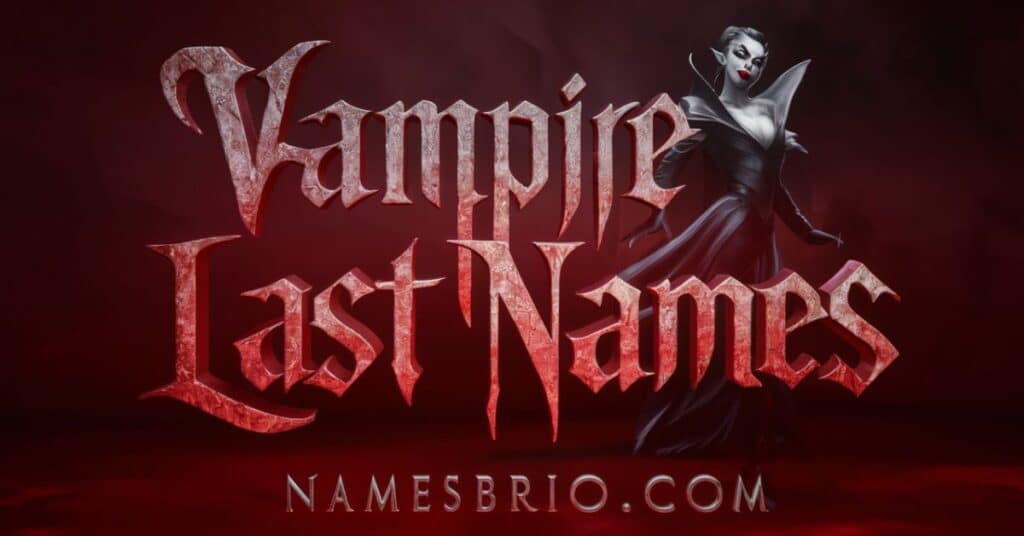
Vampire last names often carry the weight of ancient lineages and dark histories. These surnames can hint at noble origins, supernatural powers, or the lands from which the vampires hail. They might be adaptations of human names or entirely otherworldly creations.
Many vampire last names evoke a sense of grandeur and timelessness. They can reflect the clan’s values, abilities, or the era in which they rose to power. Some names might be tied to specific locations, while others suggest a more nomadic or mysterious background.
Choosing a vampire last name is about creating a sense of legacy and power. It should roll off the tongue with an air of authority and hint at the long, often dark history of the vampire lineage. The right surname can immediately establish a vampire’s place in the hierarchy of the undead.
Must Read : Alien Names
- Blackthorn: Evoking both nature and darkness, suggesting a formidable and enduring lineage.
- Dracul: A nod to the famous Dracula, meaning “dragon” or “devil” in Romanian.
- Nightshade: Referencing the poisonous plant, implying danger and allure.
- Bloodworth: A name that speaks directly to the vampire’s nature and value system.
- Shadowcrest: Suggesting a lineage that rules over shadows and darkness.
- Fangsmith: Implying a clan known for their prominent or powerful fangs.
- Moonglow: Evoking the ethereal beauty of moonlight, a vampire’s constant companion.
- Ravenscroft: Combining the mystery of ravens with an ancient-sounding suffix.
- Crimsonfall: Suggestive of blood and the fall from grace, perfect for a vampire clan.
- Darkholme: Implying a home in darkness, suitable for sun-avoiding vampires.
- Veinhardt: A play on “vein” and the German suffix “-hardt,” suggesting strength.
- Thornheart: Evoking both pain and resilience, fitting for immortal beings.
- Silvershadow: Combining the vampire’s aversion to silver with their affinity for shadows.
- Nightwing: Suggesting nocturnal flight and freedom.
- Bloodmoon: Combining vampiric sustenance with celestial mystery.
- Ebonshire: Blending darkness with a traditional English county name.
- Cryptborn: Implying origin from or association with burial places.
- Mistweaver: Suggesting the ability to manipulate mists or illusions.
- Sanguine: Directly referencing blood, the vampire’s life source.
- Darkmere: Evoking a dark, deep body of water, mysterious and dangerous.
- Hollowfang: Suggesting empty fangs, always hungry for blood.
- Nightfall: Representing the coming of darkness, a vampire’s awakening time.
- Blackheart: Implying a cold, possibly cruel nature.
- Shadowmere: Combining shadow with “mere,” suggesting a boundary of darkness.
- Duskwalker: Evoking movement at twilight, when vampires often emerge.
- Bloodraven: Combining vampiric nature with the intelligence and mystery of ravens.
- Moonfang: Linking vampiric fangs with the moon, their celestial patron.
- Grimwood: Suggesting a dark, forbidding forest, a suitable vampire domain.
- Shadowthorn: Combining shadow with thorns, implying danger in darkness.
- Nightshield: Suggesting protection by night, a vampire’s natural element.
- Darkwater: Evoking deep, mysterious bodies of water.
- Bloodstone: Named after the dark red jasper, linking to both blood and gemstones.
- Wolfsbane: Referencing the plant toxic to werewolves, suggesting power over other supernatural beings.
- Ironvein: Implying strength in the blood, a vital aspect for vampires.
- Shadowkeep: Suggesting a stronghold of darkness, a vampire’s lair.
- Nightwhisper: Evoking the quiet, secretive nature of vampires.
- Ravenclaw: Combining the mystery of ravens with a predatory aspect.
- Blacktide: Suggesting a powerful, dark force like an unstoppable tide.
- Moonsgard: Implying protection or wardenship over the moon and night.
- Shadowfell: Evoking a place of deep shadow, perhaps an otherworldly realm.
- Bloodhawk: Combining vampiric nature with the keen sight and hunting prowess of a hawk.
- Darkmist: Suggesting an ability to blend with or control dark, misty environments.
- Nightbane: Implying that the family is the bane or destruction of the night itself.
- Silentstone: Evoking the quiet and hardness of stone, fitting for ancient, unchanging vampires.
- Thornnight: Combining the pain of thorns with the darkness of night.
- Shadowheart: Suggesting a core of darkness, central to the vampire’s being.
- Blackrose: Evoking beauty and darkness, with a hint of danger.
- Moonwraith: Combining the moon with a ghostly, vengeful spirit.
- Darkbane: Suggesting mastery over or destruction of darkness itself.
- Bloodmere: Evoking a lake of blood, terrifying and vital to vampires.
Must Read: Dragonborn Names
Male Vampire Names
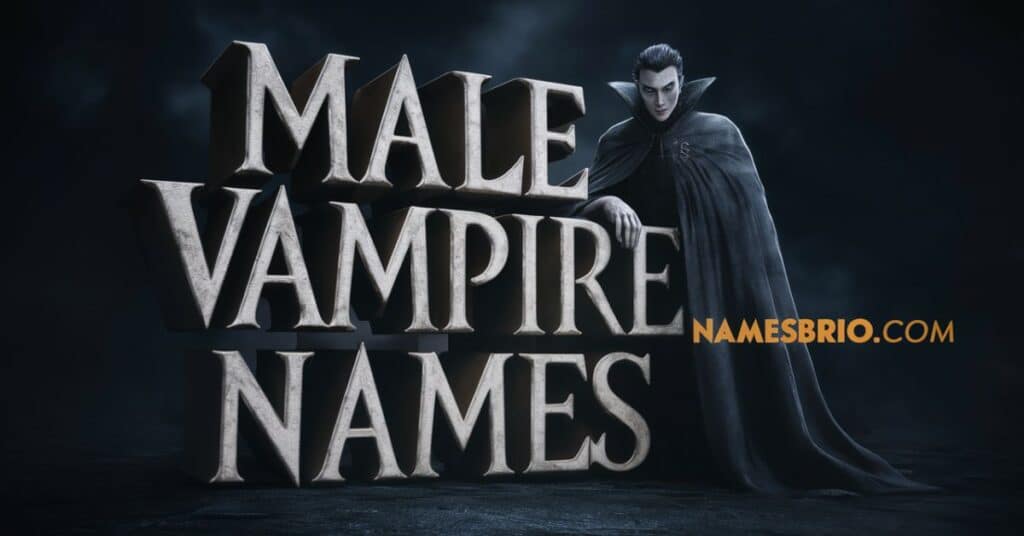
Male vampire names often exude strength, mystery, and timeless charisma. These names can reflect centuries of power or the raw energy of newly turned vampires. They might draw inspiration from various historical periods, mythologies, or the primal forces of nature.
Many male vampire names have a commanding presence, setting them apart from mortal names. They can evoke images of ancient castles, misty forests, or blood-soaked battlefields. Some names might hint at a vampire’s former mortal life, while others fully embrace their new immortal status.
Selecting a male vampire name is about capturing the essence of power and allure. It might reflect his origin, special abilities, or the era in which he was turned. The perfect name can instantly convey his status, strength, and the weight of his immortal existence.
Must Read: Xbox Gamertag Ideas
- Zephyrus: Greek god of the west wind, symbolizing swift and silent movement.
- Alaric: Gothic name meaning “ruler of all,” perfect for a powerful vampire lord.
- Corvus: Latin for “raven,” representing wisdom and darkness.
- Draven: Suggesting a blend of dragon and raven, evoking power and mystery.
- Lucian: Derived from Latin, meaning “light,” ironically fitting for a creature of darkness.
- Thorne: Implying danger and protection, like the thorns of a rose.
- Malakai: Hebrew name meaning “my messenger,” suggesting a harbinger of doom.
- Onyx: Named after the black gemstone, symbolizing strength and protection.
- Caspian: Evoking the mysterious depths of the Caspian Sea.
- Raziel: Name of an angel in Jewish mysticism, meaning “secret of God.”
- Darius: Persian name meaning “possessor,” fitting for a vampire’s acquisitive nature.
- Lestat: Famous vampire name, evoking nobility and rebellion.
- Ambrose: Meaning “immortal,” perfectly suited for an undying being.
- Noir: French for “black,” embodying darkness and sophistication.
- Cyrus: Persian name meaning “sun,” ironic for a sun-fearing creature.
- Raven: Symbolizing intelligence, mystery, and death.
- Lysander: Greek name meaning “liberator,” suggesting freedom from mortal constraints.
- Lazarus: Biblical figure who rose from the dead, fitting for an undead vampire.
- Dorian: Referencing “The Picture of Dorian Gray,” symbolizing eternal youth.
- Cerberus: Named after the three-headed dog guarding the underworld.
- Zephyr: Suggesting swift, silent movement like the west wind.
- Nyx: Greek primordial god of the night, perfect for a creature of darkness.
- Cain: Biblical first murderer, often associated with vampire lore.
- Morpheus: Greek god of dreams, suggesting the ability to manipulate minds.
- Dracul: Meaning “dragon” or “devil” in Romanian, a nod to Dracula.
- Silas: Derived from Latin “silva” meaning “wood,” evoking a forest dwelling vampire.
- Oberon: King of the fairies in medieval literature, suggesting otherworldly rule.
- Vlad: A nod to Vlad the Impaler, the inspiration for Dracula.
- Erebus: Greek god of darkness, perfectly fitting for a vampire.
- Phoenix: Symbolizing rebirth, fitting for a being that rises from death.
- Damien: Suggesting a demonic nature or connection.
- Orion: Named after the hunter constellation, implying a skilled predator.
- Dante: Evoking the journey through hell, fitting for a damned soul.
- Balthazar: Name of a Babylonian king, suggesting ancient power.
- Gideon: Hebrew name meaning “feller” or “hewer,” implying strength.
- Lucius: Derived from Latin “lux” meaning “light,” ironic for a being of darkness.
- Mephisto: Short for Mephistopheles, a demon from German folklore.
- Reaper: Personifying death itself, fitting for an immortal predator.
- Sylvan: Relating to the forest, suggesting a nature-connected vampire.
- Talon: Implying sharp claws or a bird of prey, fitting for a predator.
- Venom: Suggesting a poisonous or dangerous nature.
- Wraith: Implying a ghost-like or spectral nature.
- Xander: Short for Alexander, meaning “defender of men,” ironic for a vampire.
- Yorick: From Hamlet, suggesting a philosophical nature and connection to death.
- Zael: Meaning “movement” in Hebrew, implying swift and silent action.
- Asher: Hebrew name meaning “happy” or “blessed,” ironic for a cursed being.
- Bram: A nod to Bram Stoker, author of Dracula.
- Ciaran: Irish name meaning “little dark one,” perfect for a creature of the night.
- Draco: Latin for “dragon,” suggesting power and fear.
- Evander: Greek name meaning “good man,” ironic for a predatory vampire.
Must Read : Duo Names
Cool Vampire Names
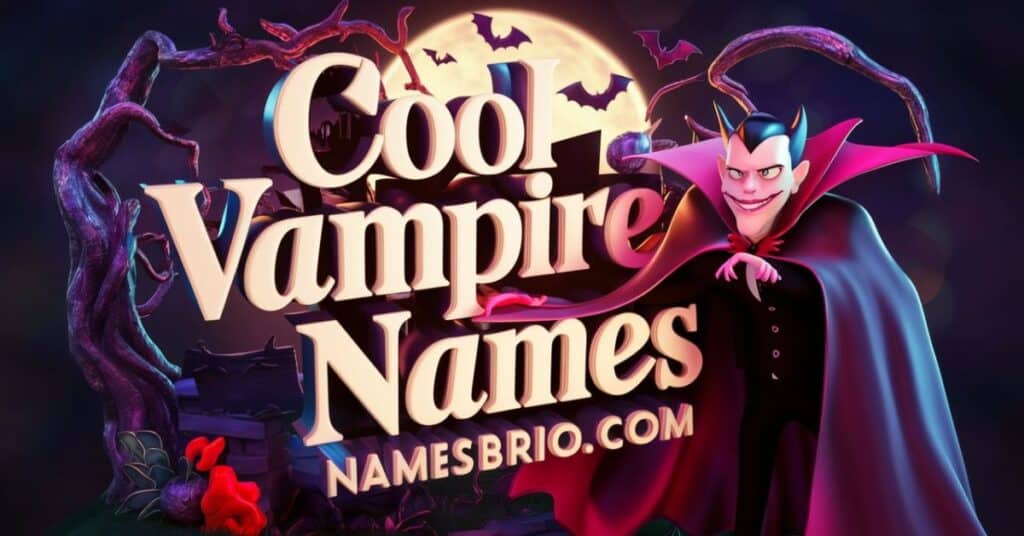
Cool vampire names blend edginess with a touch of timeless appeal. These names often incorporate elements of danger, mystery, and allure, creating an irresistible aura of dark charm. They might draw inspiration from various languages, mythologies, or even modern subcultures.
Many cool vampire names have a certain rhythm or sound that rolls off the tongue, making them memorable and impactful. They can evoke images of leather-clad antiheroes, enigmatic loners, or charismatic leaders of the undead. Some names might hint at specific powers or traits, while others simply exude an aura of undeniable coolness.
Choosing a cool vampire name is about striking the right balance between edgy and timeless. It should sound appealing to modern ears while still carrying the weight of immortal years. The perfect cool vampire name can make a character instantly intriguing and unforgettable.
Must Read : Funny Roblox Names
- Blade: Evoking sharpness and danger, perfect for a vampire hunter turned vampire.
- Raven: Symbolizing mystery, intelligence, and a connection to the night.
- Ash: Suggesting both destruction and what remains, fitting for an undead being.
- Zephyr: Implying swift, silent movement like the west wind.
- Nova: Suggesting a bright, explosive force, ironically fitting for a creature of darkness.
- Onyx: Named after the black gemstone, symbolizing protection and strength.
- Echo: Implying a mysterious, repeating presence.
- Hawk: Suggesting keen eyesight and predatory nature.
- Shade: Representing shadows and elusive darkness.
- Blaze: Ironically fiery name for a creature vulnerable to sunlight.
- Rogue: Implying a rebellious, unpredictable nature.
- Storm: Suggesting power, darkness, and turbulence.
- Vex: Meaning to trouble or haunt, perfect for a tormenting vampire.
- Wolf: Connecting to another famous creature of the night.
- Zeal: Implying intense passion or dedication.
- Flint: Suggesting the ability to spark fear or ignite passion.
- Grim: Evoking a sense of doom and darkness.
- Jet: Referencing the black gemstone and implying speed.
- Knox: Sounding strong and succinct, with a touch of mystery.
- Lynx: Suggesting keen senses and silent hunting skills.
- Neon: An unexpectedly bright name, contrasting with vampiric nature.
- Pyre: Evoking images of ritual fires and destruction.
- Quill: Implying both writing and a sharp point, perhaps for a scholarly vampire.
- Rift: Suggesting a break or divide, perhaps between life and death.
- Slate: Evoking a blank, grey stone, implying an unreadable nature.
- Talon: Implying sharp claws and a predatory nature.
- Vapor: Suggesting an elusive, intangible quality.
- Wrath: Embodying anger and vengeance.
- Xenon: Sounding otherworldly.
- Yield: Ironically peaceful name for a predator, or implying forcing others to submit.
- Zion: Suggesting a promised land or ultimate goal.
- Axel: Implying a central figure around which others revolve.
- Blitz: Suggesting swift, lightning-like attacks.
- Cinder: Evoking images of destruction and remnants of fire.
- Dex: Short and sharp, suggesting dexterity and skill.
- Enigma: Embodying mystery and puzzlement.
- Fang: Directly referencing vampiric nature.
- Glaive: Named after a deadly medieval weapon.
- Havoc: Implying chaos and destruction.
- Ichor: In Greek mythology, the ethereal fluid in gods’ veins.
- Jett: Variant of Jet, also meaning “black as coal.”
- Klaw: Stylized “claw,” emphasizing predatory nature.
- Lycan: Referencing werewolves, suggesting a connection to multiple night creatures.
- Mace: Named after the medieval weapon, implying danger.
- Nix: Meaning “nothing” in Latin, or referencing water spirits in Germanic mythology.
- Obsidian: Named after the dark, glassy volcanic rock.
- Phantom: Suggesting a ghostly, elusive nature.
- Quantum: Implying complexity and the breaking of natural laws.
- Reaver: Meaning “plunderer” or “robber,” fitting for a predatory vampire.
- Sable: Referring to the dark fur, symbolizing luxury and darkness.
Must Read : Funny Steam Names
Ancient Vampire Names
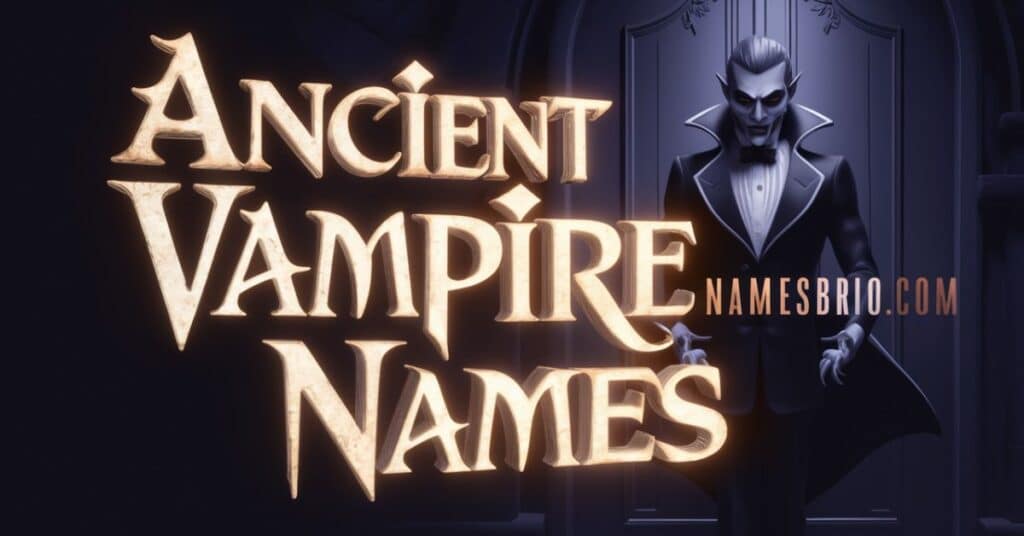
Ancient vampire names carry the weight of millennia, evoking a sense of timeless power and forgotten lore. These names often draw from ancient civilizations, lost languages, and primordial concepts. They reflect the vastness of a vampire’s lifespan and the depth of their historical knowledge.
Many ancient vampire names have a mystical or archaic quality, setting them apart from both modern and medieval monikers. They might hint at long-lost empires, primeval gods, or concepts as old as time itself. These names often carry hidden meanings or references to ancient myths and legends.
Choosing an ancient vampire name is about capturing the essence of ageless wisdom and power. It should sound as if it could have been whispered in the halls of long-forgotten temples or etched into the walls of prehistoric caves. The right name can instantly convey the vampire’s incredible age and the secrets they’ve accumulated over countless centuries.
Must Read : Softball Team Names
- Akhenra: Blending Egyptian elements, suggesting a pharaoh-like vampire.
- Balathu: Inspired by ancient Mesopotamian names, evoking primordial power.
- Cythraul: Drawing from Welsh mythology, suggesting an underworld connection.
- Dagan: Ancient Semitic deity name, implying god-like status.
- Ereshkigal: Mesopotamian goddess of the underworld, perfect for a female vampire.
- Fenriz: Norse-inspired name, evoking the wolf that swallows the sun.
- Gilgamesh: Ancient Sumerian king, symbolizing the quest for immortality.
- Heka: Egyptian concept of magic and power, fitting for a sorcerer vampire.
- Ishtar: Babylonian goddess of love and war, suitable for a seductive vampire.
- Jormungandr: Norse world serpent, suggesting a world-encompassing vampire.
- Kali: Hindu goddess of time and death, perfect for a destructive vampire.
- Lamashtu: Mesopotamian demon, ideal for a child-threatening vampire.
- Marduk: Babylonian god, implying supreme power over other deities.
- Nergal: Mesopotamian god of the underworld, war, and plague.
- Osiris: Egyptian god of the dead, fitting for a resurrected vampire.
- Pazuzu: Mesopotamian demon of the southwest wind, suitable for a terrifying vampire.
- Quetzalcoatl: Aztec feathered serpent god, for a vampire with Mesoamerican origins.
- Ra-Horakhty: Combined Egyptian sun gods, ironic for a sun-fearing vampire.
- Sekhmet: Egyptian goddess of war and healing, for a violent yet protective vampire.
- Tiamat: Babylonian goddess of primordial chaos, for a vampire sowing discord.
- Utu: Sumerian sun god, another ironic choice for a vampire.
- Veles: Slavic god of the underworld and magic, fitting for an Eastern European vampire.
- Xibalba: Mayan underworld, suitable for a vampire ruling over death.
- Ymir: Norse primordial giant, for a vampire of colossal power or size.
- Zorya: Slavic guardian goddess, for a vampire protector.
- Anubis: Egyptian god of mummification, fitting for a vampire dealing in death.
- Bast: Egyptian cat goddess, for a graceful, predatory vampire.
- Charon: Greek ferryman of the dead, for a vampire guiding souls.
- Damballa: Haitian Vodou sky god, for a serpentine vampire.
- Enki: Sumerian god of wisdom, for an intelligent, crafty vampire.
- Forseti: Norse god of justice, for a vampire with a strict code.
- Gorgon: Greek mythical creature, for a petrifying vampire.
- Hades: Greek god of the underworld, for a ruling vampire.
- Ixchel: Mayan goddess of midwifery and medicine, for a healing vampire.
- Janus: Roman god of beginnings and transitions, for a transformative vampire.
- Kitsune: Japanese fox spirit, for a shapeshifting vampire.
- Loki: Norse trickster god, for a mischievous vampire.
- Morrigan: Celtic goddess of war, for a battle-loving vampire.
- Nephthys: Egyptian funerary goddess, for a vampire of the tomb.
- Odin: Norse god of wisdom and death, for an all-knowing vampire.
- Persephone: Greek queen of the underworld, for a vampire straddling life and death.
- Quetzal: Mayan word for “divine,” for a god-like vampire.
- Rhea: Greek titan mother, for an ancient matriarchal vampire.
- Seth: Egyptian god of chaos, for a vampire sowing discord.
- Thoth: Egyptian god of wisdom, for a scholarly vampire.
- Uriel: Archangel of wisdom, for a fallen angel vampire.
- Viracocha: Incan creator god, for a vampire shaping reality.
- Wepwawet: Egyptian opener of ways, for a pathfinding vampire.
- Xipe Totec: Aztec god of rebirth, for a cyclically reborn vampire.
- Yama: Hindu god of death, for a vampire judge of souls.
Must Read : Boxing Nicknames
Romantic Vampire Names
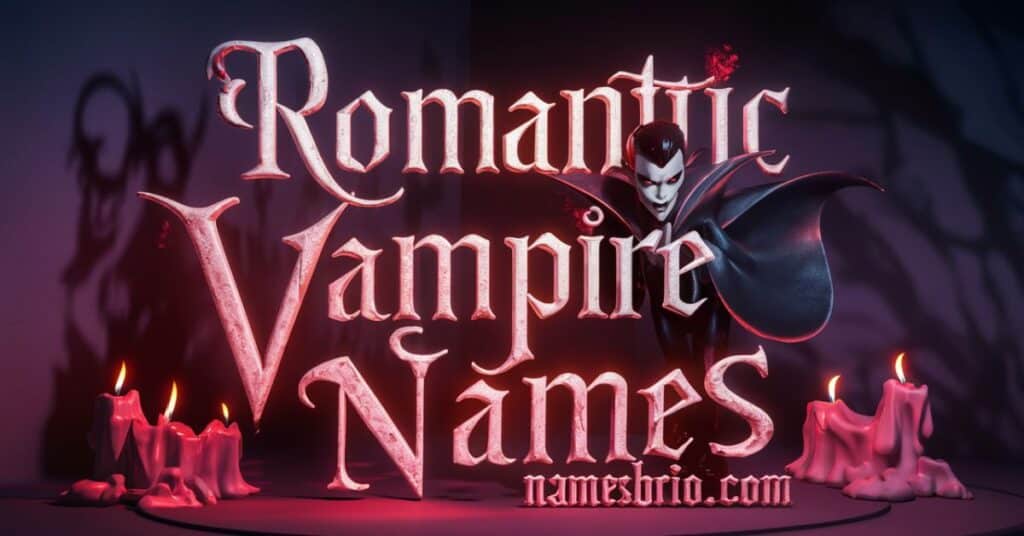
Romantic vampire names blend allure, passion, and a touch of dangerous charm. These names often evoke images of moonlit encounters, forbidden love, and eternal devotion. They might draw inspiration from classic literature, romantic languages, or concepts associated with love and desire.
Many romantic vampire names have a lyrical quality, rolling off the tongue like a lover’s whisper. They can suggest deep emotions, intense connections, or the bittersweet nature of immortal love. Some names might hint at the vampire’s seductive powers, while others emphasize the tragic aspect of loving an undead being.
Selecting a romantic vampire name is about capturing the essence of undying passion. It should sound appealing and alluring, with perhaps a hint of danger or sorrow. The perfect romantic vampire name can make a character irresistibly captivating, embodying the ultimate forbidden fruit of love.
Must Read : Nicknames That Start With O
- Ambrosius: Suggesting the sweetness of ambrosia, the food of the gods.
- Belladonna: Italian for “beautiful lady,” also a deadly nightshade plant.
- Casimir: Slavic name meaning “destroyer of peace,” fitting for turbulent love.
- Damien: Suggesting a touch of the demonic in love.
- Eros: Greek god of love, perfect for a seductive vampire.
- Fiero: Italian for “proud” or “fierce,” suggesting passionate love.
- Galatea: From Greek mythology, a statue brought to life by love.
- Helios: Greek sun god, ironic for a creature of night.
- Ianthe: Greek for “violet flower,” suggesting delicate beauty.
- Jasper: Persian name meaning “treasurer,” implying one who hoards love.
- Kieran: Irish name meaning “little dark one,” perfect for a brooding lover.
- Lysander: Greek name meaning “liberator,” freeing one’s heart.
- Maeve: Irish name associated with intoxication, fitting for intoxicating love.
- Narcisse: From Narcissus, suggesting self-love or beauty.
- Olivier: French name, evoking images of peace and olive branches.
- Persephone: Greek goddess who spends half her time in the underworld.
- Quillon: From “quill,” suggesting a romantic writer or poet.
- Rhapsody: Implying intense emotional expression or ecstasy.
- Soren: Danish name meaning “stern,” for a serious, brooding lover.
- Tristan: From Arthurian legend, representing tragic love.
- Umbra: Latin for “shadow,” suggesting mysterious love.
- Valerian: Latin name meaning “strength,” also a plant used in love potions.
- Whisper: Suggesting intimate, secretive love.
- Xaviera: Basque name meaning “new house,” implying a new beginning in love.
- Yseult: Another name for Isolde from Arthurian legend, representing forbidden love.
- Zephyrus: Greek god of the west wind, suggesting gentle, caressing love.
- Amour: French for “love,” direct and passionate.
- Briar: Suggesting both beauty (like a rose) and pain (like thorns).
- Cressida: Character from Troy, representing complex love.
- Daphne: Greek nymph transformed into a laurel tree to escape Apollo’s love.
- Evander: Greek name meaning “good man,” ironic for a vampire lover.
- Faye: Suggesting fairy-like enchantment in love.
- Gideon: Hebrew name meaning “feller” or “hewer,” implying powerful love.
- Hawthorn: A plant associated with both love and death in folklore.
- Isolde: From the tragic love story of Tristan and Isolde.
- Juliet: From Shakespeare’s romantic tragedy, representing young, passionate love.
- Kismet: Turkish word for fate or destiny, implying fated love.
- Leander: From Greek mythology, a youth who swam across a strait nightly to meet his lover.
- Myrtle: Plant sacred to Venus, goddess of love.
- Nyx: Greek goddess of night, perfect for nocturnal romance.
- Orpheus: Mythical Greek musician who tried to rescue his wife from the underworld.
- Pyramus: From the tragic love story of Pyramus and Thisbe.
- Quartz: Crystal often associated with love and healing.
- Romeo: The ultimate symbol of romantic love from Shakespeare.
- Sappho: Ancient Greek poet known for love poetry.
- Tempest: Suggesting a stormy, passionate love.
- Uriel: Name of an archangel, suggesting divine love.
- Valentina: From St. Valentine, patron saint of lovers.
- Wisteria: Flowering plant symbolizing devotion.
- Zinnia: Flower symbolizing lasting affection.
Must Read: Dragonborn Names
Modern Vampire Names
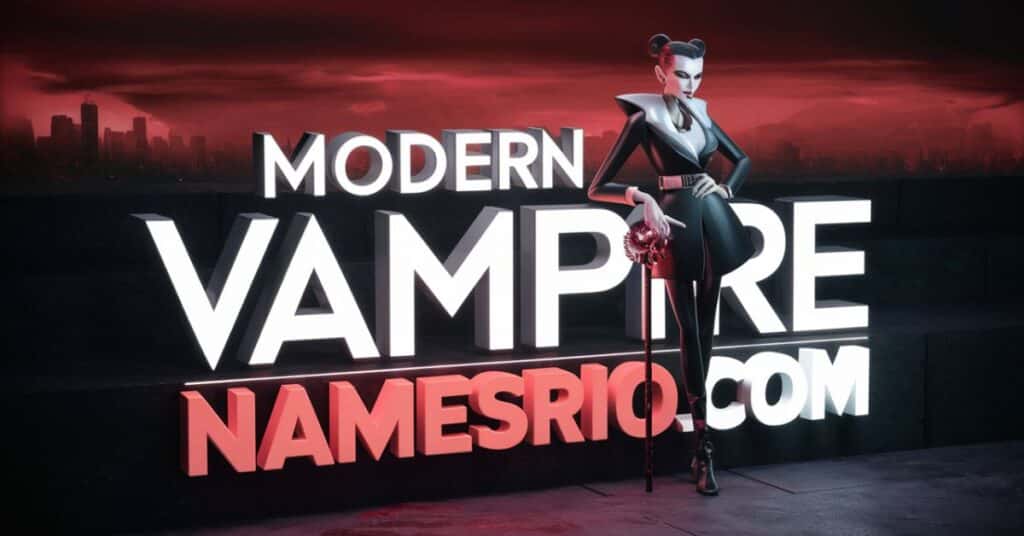
Modern vampire names blend contemporary coolness with a timeless allure. These names often reflect current trends, pop culture, or modern concepts, while still maintaining an air of mystery and power. They might draw inspiration from technology, urban legends, or current societal themes.
Many modern vampire names have a sleek, edgy quality that appeals to current sensibilities. They can evoke images of stylish nightclub owners, tech-savvy immortals, or vampires adapting to the 21st century. Some names might hint at specific modern-day powers or traits, while others simply exude a contemporary vibe.
Choosing a modern vampire name is about striking a balance between current appeal and timeless charm. It should sound fresh and relevant to modern ears while still carrying the weight of immortal years. The perfect modern vampire name can make a character feel both current and ageless, bridging the gap between ancient lore and contemporary fiction.
Must Read: Wizard Names
- Apex: Suggesting the top of the food chain in the modern world.
- Binary: Reflecting the digital age, perfect for a tech-savvy vampire.
- Cipher: Implying mystery and coded information.
- Diesel: Evoking power and modernity.
- Echo: Suggesting repetition through time.
- Flare: Implying sudden brightness, ironic for a creature of darkness.
- Glitch: Perfect for a vampire who manipulates technology.
- Helix: Referencing DNA, suggesting biological manipulation.
- Indie: Implying an independent, non-traditional vampire.
- Jett: Modern spelling of “Jet,” suggesting speed and darkness.
- Krypto: Hinting at hidden, encrypted existence.
- Lithium: Element used in batteries, suggesting stored power.
- Matrix: Implying a complex system or alternate reality.
- Neon: Bright and eye-catching, contrasting with traditional vampire imagery.
- Omega: The last letter of the Greek alphabet, suggesting finality or ultimate power.
- Pixel: Referencing digital imagery, perfect for a vampire in the internet age.
- Quantum: Implying manipulation of fundamental forces.
- Rebel: Suggesting defiance against traditional vampire norms.
- Syntax: Implying order and structure in the chaos of vampire existence.
- Tesla: Nodding to the inventor, perfect for a scientific vampire.
- Urban: Reflecting a city-dwelling, modern vampire.
- Vector: Implying direction and magnitude, perhaps in spreading vampirism.
- Watt: Unit of power, suggesting energy manipulation.
- Xenon: Noble gas, suggesting rarity and illumination.
- Yield: Implying surrender, perhaps to vampiric nature or modern times.
- Zero: Suggesting a starting point or nullification.
- Alias: Implying multiple identities in the digital age.
- Byte: Small unit of digital information, for a detail-oriented vampire.
- Chrome: Suggesting sleekness and modernity.
- Dart: Implying speed and precision.
- Epoch: A period of time, fitting for a long-lived vampire.
- Flux: Suggesting constant change and adaptation.
- Giga: Prefix meaning billion, implying vast power or knowledge.
- Holo: Short for hologram, suggesting illusion or projection.
- Icon: Implying legendary status in modern culture.
- Jet: Suggesting both darkness and speed.
- Kindle: Ironically referencing fire for a vampire.
- Lynk: Modern spelling of “Link,” suggesting connections.
- Meme: Reflecting internet culture and viral spread.
- Nexus: Implying a connection or central point.
- Onyx: Black gemstone, modernized as a name.
- Prism: Suggesting the splitting of light, ironic for a vampire.
- Quark: Fundamental particle, for a vampire interested in physics.
- Rogue: Suggesting a solitary, rebellious nature.
- Sync: Implying harmony or alignment with modern times.
- Tron: Suffix from “electron,” suggesting a technological vampire.
- Uber: German for “above,” suggesting superiority.
- Vortex: Implying a powerful, swirling force.
- Wired: Suggesting constant connection to technology.
- Xcel: Modern abbreviation of “accelerate,” implying speed.
Must Read : Duo Names
Elemental Vampire Names
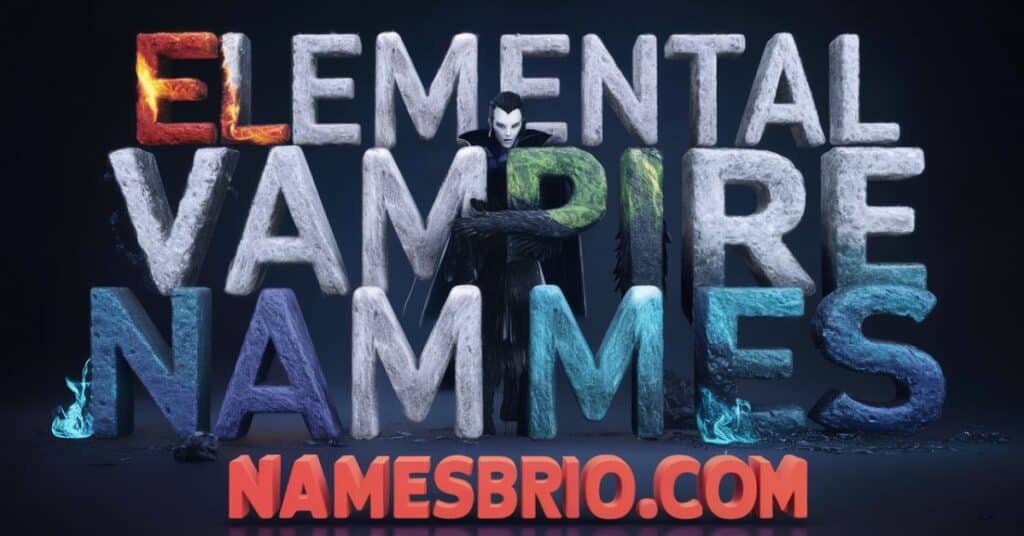
Elemental vampire names draw inspiration from the forces of nature, combining the raw power of the elements with vampiric mystique. These names often evoke images of vampires who have mastered or embodied certain natural phenomena. They might reference fire, water, earth, air, or more abstract concepts like light and shadow.
Many elemental vampire names have a primal, powerful quality that suggests a deep connection to the natural world. They can imply control over specific elements, or a vampire’s affinity with certain aspects of nature. Some names might hint at elemental origins, while others suggest the vampire’s preferred hunting ground or method.
Choosing an elemental vampire name is about capturing the essence of natural forces combined with undead power. It should evoke the raw energy of the elements while maintaining an air of supernatural allure. The perfect elemental vampire name can make a character feel both ancient and timeless, deeply connected to the primordial forces of the world.
- Ashen: Suggesting both fire (ash) and earth.
- Blast: Evoking powerful wind or explosive force.
- Cinder: Implying smoldering fire and destruction.
- Drift: Suggesting snow or sand moved by wind.
- Ember: Evoking dying fire, perfect for a vampire’s twilight existence.
- Frost: Implying ice and cold.
- Gale: Suggesting strong wind.
- Haze: Evoking unclear air or vision.
- Inferno: Implying intense, all-consuming fire.
- Jolt: Suggesting electricity or sudden movement.
- Kyanite: A blue mineral, combining earth and sky elements.
- Lava: Evoking molten earth and intense heat.
- Mist: Suggesting water in air, perfect for an elusive vampire.
- Nimbus: A rain cloud, combining air and water.
- Obsidian: Volcanic glass, combining earth and fire.
- Pulse: Suggesting rhythmic energy or electricity.
- Quake: Evoking earth-shaking power.
- Rime: A frost formed by rapid freezing, combining air and water.
- Storm: Suggesting a combination of wind, rain, and lightning.
- Tidal: Evoking the power of the sea.
- Umbra: The darkest part of a shadow, combining light and dark.
- Vortex: Suggesting a whirling mass of air or water.
- Wisp: Evoking a small, elusive flame or spirit.
- Xenolith: A rock fragment enveloped in another rock, suggesting hidden earth power.
- Zephyr: A gentle west wind, suggesting subtle air control.
- Aurora: The northern lights, combining sky and light elements.
- Blaze: Suggesting intense fire or light.
- Cosmos: Evoking the elements of the entire universe.
- Dune: Suggesting control over sand and desert.
- Eclipse: Combining elements of light and shadow.
- Flare: A sudden burst of light or fire.
- Glacier: Suggesting massive, slow-moving ice.
- Horizon: The line where earth meets sky.
- Igneous: Relating to fire and volcanic activity.
- Jasper: An opaque gemstone, suggesting earth elements.
- Karst: Landscape formed by dissolved rocks, combining earth and water.
- Lumina: Suggesting control over light.
- Magma: Molten rock beneath the Earth’s surface.
- Nova: A star showing a sudden increase in brightness, suggesting fire and light.
- Ozone: A form of oxygen, suggesting air control.
- Pyro: Prefix relating to fire.
- Quicksilver: Another name for mercury, suggesting fluid metal.
- Radiance: Suggesting control over light and energy.
- Sirocco: A hot, dusty wind from North Africa.
- Tempest: A violent windstorm, often with rain or snow.
- Updraft: An upward air current.
- Verdigris: The green patina formed on copper, combining metal and air.
- Wellspring: A source of abundant supply of water.
- Xerotes: Abnormal dryness, suggesting control over absence of water.
- Ymir: In Norse mythology, the primordial frost giant from whose body the world was created.
Celestial Vampire Names
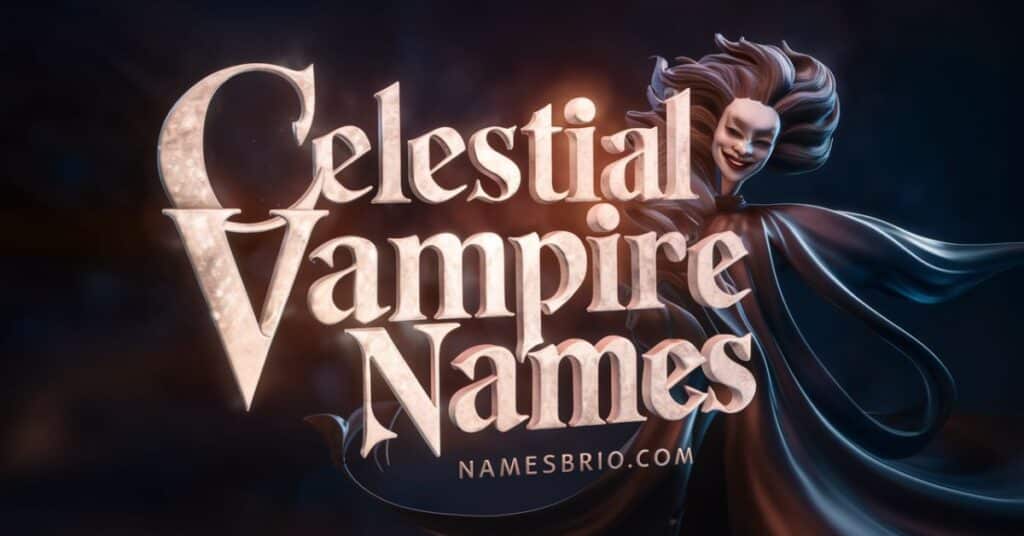
Celestial vampire names draw inspiration from the cosmos, blending the vastness of space with vampiric mystique. These names often evoke images of vampires who have transcended earthly bounds, embodying cosmic forces or celestial bodies. They might reference stars, planets, constellations, or abstract cosmic concepts.
Many celestial vampire names have an ethereal, otherworldly quality that suggests a connection to the universe beyond Earth. They can imply origins from or power over celestial bodies, or a vampire’s affinity with the night sky. Some names might hint at cosmic origins, while others suggest the vampire’s ability to manipulate celestial forces.
Choosing a celestial vampire name is about capturing the essence of the cosmos combined with undead power. It should evoke the mystery and majesty of the night sky while maintaining an air of supernatural allure. The perfect celestial vampire name can make a character feel both ancient and infinite, deeply connected to the vast expanse of the universe.
- Altair: Brightest star in the constellation Aquila.
- Betelgeuse: Red supergiant star in the constellation Orion.
- Cassiopeia: Constellation named after the vain queen in Greek mythology.
- Draco: Constellation representing a dragon.
- Elara: One of Jupiter’s moons, named after Zeus’s lover.
- Fomalhaut: Brightest star in the constellation Piscis Austrinus.
- Ganymede: Largest moon of Jupiter.
- Helios: Greek personification of the Sun.
- Io: Volcanic moon of Jupiter.
- Juno: Roman goddess and name of an asteroid.
- Kochab: Star in the Little Dipper constellation.
- Lyra: Constellation representing Orpheus’s lyre.
- Mira: Variable star known as the “Wonderful Star”.
- Nebula: Cloud of gas and dust in space.
- Oberon: Outermost major moon of Uranus.
- Polaris: The North Star.
- Quasar: Extremely luminous active galactic nucleus.
- Rigel: Brightest star in the constellation Orion.
- Sirius: Brightest star in the Earth’s night sky.
- Titan: Largest moon of Saturn.
- Ursa: From Ursa Major, the Great Bear constellation.
- Vega: Brightest star in the constellation Lyra.
- Wezen: Star in the constellation Canis Major.
- Xena: Nickname for dwarf planet Eris.
- Ymir: Moon of Saturn named after the primordial giant in Norse mythology.
- Zenith: Highest point in the celestial sphere.
- Alcyone: Brightest star in the Pleiades cluster.
- Bellatrix: Third-brightest star in the constellation Orion.
- Ceres: Dwarf planet in the asteroid belt.
- Deimos: Smaller moon of Mars.
- Eris: Most massive dwarf planet known.
- Fornax: Constellation representing a chemical furnace.
- Galatea: Moon of Neptune named after a sea nymph.
- Hydra: Largest constellation in the night sky.
- Iris: Asteroid named after the Greek rainbow goddess.
- Jupiter: Largest planet in our solar system.
- Kuiper: Named after the Kuiper Belt beyond Neptune.
- Lunara: Derived from Luna, the Moon.
- Magellan: Named after the spacecraft that mapped Venus.
- Nix: Moon of Pluto named after the Greek goddess of night.
- Orion: Prominent constellation named after a hunter in Greek mythology.
- Phoenix: Constellation representing the mythical bird.
- Quantum: Suggesting manipulation of cosmic forces.
- Rhea: Second-largest moon of Saturn.
- Sagan: After Carl Sagan, famous astronomer.
- Triton: Largest moon of Neptune.
- Umbriel: Moon of Uranus named after a character in Alexander Pope’s poem.
- Vesper: Evening star, the planet Venus.
- Wormhole: Hypothetical topological feature of spacetime.
- Zwicky: Named after Fritz Zwicky, who studied supernovae.
Mythological Vampire Names
Mythological vampire names draw inspiration from various world mythologies, legends, and folklore. These names often evoke images of vampires who embody or are connected to ancient deities, legendary creatures, or mythical concepts. They might reference gods, heroes, monsters, or abstract mythological ideas from different cultures.
Many mythological vampire names carry a sense of ancient power and timeless mystery. They can imply origins from or connections to specific mythological figures or concepts. Some names might hint at the vampire’s abilities or nature, while others suggest their role in the supernatural world.
Choosing a mythological vampire name is about capturing the essence of legendary beings and concepts. It should evoke the power and mystery of ancient myths while maintaining a vampiric allure. The perfect mythological vampire name can make a character feel both ancient and legendary, deeply rooted in the collective stories of humanity.
- Ambrosia: In Greek mythology, the food of the gods granting immortality.
- Balor: In Irish mythology, a destructive giant with a poisonous eye.
- Chimera: Monstrous fire-breathing hybrid creature in Greek mythology.
- Dagon: Ancient Mesopotamian deity associated with fertility and fish.
- Echidna: Mother of monsters in Greek mythology.
- Fenrir: Monstrous wolf in Norse mythology.
- Gorgon: Snake-haired creatures in Greek mythology that could turn onlookers to stone.
- Hecate: Greek goddess of magic, crossroads, and ghosts.
- Ishtar: Mesopotamian goddess of love and war.
- Jormungandr: World serpent in Norse mythology.
- Kali: Hindu goddess of time, creation, destruction, and power.
- Leviathan: Sea monster referenced in the Hebrew Bible.
- Morrigan: Irish goddess of fate, war, and death.
- Nyx: Greek goddess of the night.
- Osiris: Egyptian god of the afterlife, the dead, and resurrection.
- Perseus: Greek hero who slayed Medusa.
- Quetzalcoatl: Feathered serpent deity in Mesoamerican mythology.
- Ragnarok: The final destruction of the world in Norse mythology.
- Sekhmet: Egyptian warrior goddess and goddess of healing.
- Typhon: Monstrous serpentine giant in Greek mythology.
- Ubume: A ghost of a woman who died in childbirth in Japanese mythology.
- Valkyrie: Female figures in Norse mythology who choose who lives and dies in battle.
- Wendigo: Mythical man-eating creature in Algonquian-speaking peoples’ traditions.
- Xiuhtecuhtli: Aztec god of fire and time.
- Yggdrasil: Immense mythical tree connecting the nine worlds in Norse cosmology.
- Zephyrus: Greek god of the west wind.
- Anubis: Egyptian god associated with mummification and the afterlife.
- Baba Yaga: Supernatural being in Slavic folklore.
- Cerberus: Three-headed dog guarding the gates of the Underworld in Greek mythology.
- Dullahan: Headless horseman in Irish mythology.
- Erebus: Primordial deity of darkness in Greek mythology.
- Freyja: Norse goddess associated with love, beauty, and death.
- Gaia: Primordial goddess of the Earth in Greek mythology.
- Hel: Norse goddess of the underworld.
- Izanami: Japanese goddess of creation and death.
- Janus: Roman god of beginnings, transitions, and endings.
- Kraken: Legendary sea monster of giant proportions.
- Loki: Trickster god in Norse mythology.
- Medusa: Gorgon from Greek mythology whose gaze turned people to stone.
- Nemesis: Greek goddess of retribution.
- Orcus: Roman god of the underworld and punisher of broken oaths.
- Persephone: Greek goddess of spring growth and queen of the underworld.
- Qilin: Mythical hooved creature in Chinese mythology.
- Rusalka: Water nymph in Slavic mythology.
- Styx: River forming the boundary between Earth and the Underworld in Greek mythology.
- Thanatos: Greek personification of death.
- Utgard: Realm of the giants in Norse mythology.
- Veles: Slavic god of earth, waters, and the underworld.
- Wyvern: Legendary winged creature with a dragon’s head and reptilian body.
- Xolotl: Aztec god of lightning and death.
How to Choose Your Perfect Vampire Names
Picking a vampire name is all about vibe. Think about your character’s backstory. Were they turned in Victorian London or ancient Rome? This can guide your choice.
Mix old and new for a unique twist. Combine a classic first name with a modern last name. Or go for something totally out there. Remember, vampires don’t play by the rules!
Top Vampire Name Categories
Gothic Classics
These names ooze old-world charm. Think Lucien, Carmilla, or Dorian.
Modern Edge
For vampires born in recent centuries. Names like Blade, Selene, or Spike fit the bill.
Nature-Inspired
Reflect your vampire’s connection to the night. Luna, Raven, or Frost work well here.
Royal Flair
Many vampires have noble backgrounds. Names like Baroness, Duke, or Lady suit this style.
Mythological Twist
Borrow from ancient legends. Lilith, Osiris, or Nyx pack a powerful punch.
FAQs About Vampire Names
How do I make my vampire name sound authentic?
Research historical naming conventions and blend them with darker elements.
Can I use a regular name for my vampire character?
Absolutely! Sometimes the contrast of a common name with vampiric nature creates intrigue.
Are there any vampire naming traditions I should know?
Some lore suggests vampires take new names after turning, reflecting their new identity.
Should my vampire name be hard to pronounce?
Not necessarily. Choose what feels right for your character and story.
Can I create a completely original vampire name?
Of course! Creativity is key in the vampire world. Invent away!
Conclusion
Choosing vampire names is a thrilling part of character creation. It’s your chance to craft an identity that spans centuries. Whether you go classic or cutting-edge, your name sets the tone for your vampiric adventures.
Remember, the perfect vampire name is one that feels right to you. It should send shivers down spines and spark curiosity. So go ahead, embrace your dark side, and pick a name that’ll stand the test of time!

James Dean is an experienced blogger at Name Brio, specializing in creative and unique names. With a passion for wordplay and a knack for crafting engaging content, Tomas brings fresh ideas and expert insights to every post. His love for names and storytelling makes his work a go-to resource for readers seeking inspiration.

